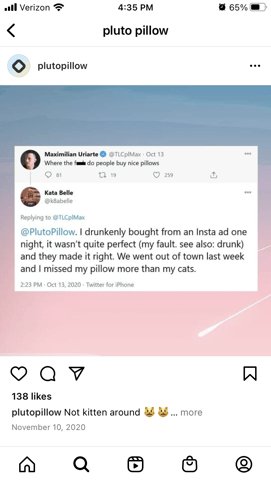Don’t Let Your Blog Tank Your Valuation: 3 Startup Comms Tips from 2 Startup Attorneys

What's the difference between a $100m startup and a $10m startup?
One possible answer: lawsuits.
That was a key takeaway from a conversation I had with startup attorneys Jeff Brown (who focuses on marketing and branding for startups) and Galen Mason (who deals with the venture, equity, and investment side of startup law) of Michael Best.
I asked them whether it was possible for content, PR, and social media to inadvertently cause legal trouble for startups.
Short answer: yes.
For the longer answer – plus tips on how to minimize the odds that your communications land you in the courtroom – keep reading.
Tip 1: Some Claims Need Substantiation
“Startup communications missteps mostly relate to claims,” said Jeff. The most common problem: a startup makes a claim that’s capable of being substantiated but is not adequately substantiated.
For example: “We have the fastest internet in town.”
Internet speed is measurable; if your startup’s internet is slower than anyone else’s, this claim is demonstrably false. In a best-case scenario, that can cost you customers who realize that they’re not getting what they paid for because your marketing materials aren’t trustworthy.
In a worst-case scenario, that kind of claim can trigger a lawsuit. A high-profile recent example? When student loan aid startup Frank was found to have fabricated four million customer accounts during its purchase by JPMorgan Chase.
Figure 1: Screenshot of Frank’s homepage with fabricated claims, Sept. 2021 (Source)
But there is some nuance here.
“‘Pride of manufacturer’ claims are generally understood to not require substantiation,” Jeff explained. If you claim to sell, for example, “the tastiest burger in the Midwest,” most consumers understand that that claim does not require data.
What's more, Galen pointed out that there's a general understanding that many sales materials include what's known as “puffery” – i.e., fluff. Like if your face wash promises a “otherworldlly skin cleansing experience.”
As long as such claims don’t contradict provable facts, Jeff says, you’re generally in the clear.
But that’s not the only way startup communications can lead to legal trouble. Customer reviews and testimonials may also lead to problems. Which leads me to the second tip.
Tip 2: The Rules for Using Customer Reviews Are Changing
Customer reviews and testimonials have long been recognized as a powerful marketing tool. After all, what a brand’s customer says about them is a lot more reliable than what the brand says about itself.
Customer-generated content has taken on new life in the age of social media, where anyone can effectively publish a review of any company at any time.
Jeff offered a few words of warning about using testimonials and reviews in marketing.
First: if you’re promoting a customer review in marketing materials, it should be representative of your reviews overall. If it’s not, that should be communicated in a clear and direct way.
“So it’s not, ‘We got 4,000 reviews and this was our best one, so let’s use it,’” he explained. “If there's a difference between what's quoted in the review and what's representative, that has to be communicated.”
Another important note on using customer-created content in marketing: the substantiation rule still applies!
Jeff mentioned that this rule was at the heart of a case currently making its way through the legal system: one company was promoting a user review to the effect of “I love that their product is all organic.” But the product was not, in fact, entirely organic.
So a competitor sued.
(For what it’s worth, I think the beauty of using customer reviews to promote a brand on social media is precisely that they don't need to have substantiated claims to be powerful because social media is all about ~vibes~.)

Figure 2: Informal Pluto Pillow review from Twitter promoted as an ad on Instagram
One last note on testimonials and reviews: the FTC is working on new rules for how companies can use testimonials in marketing, in part to provide guidance around paid influencer marketing and to address the scourge of fake reviews, particularly in online marketplaces.
And speaking of online…
Tip 3: The Internet Is Permanent
According to Jeff, there's a misconception that content that goes on the internet is less dangerous than what goes into print.
“It’s much harder to scrub and remove [online content],” said Jeff. “It can actually be more dangerous."
He offered an example of a company he works with in a highly regulated industry: the company has a “robust team” that vets any type of communication before it goes live – especially materials destined for the internet.
The risk to startups: there are multiple ways to track down historical records, and virtually anyone can do this work – competitors, consumers, disgruntled employees. Make a claim online, and your startup had better be able to back it up.
Figure 3: Preserved Theranos homepage slider featuring Bill Clinton hobnobbing with (now disgraced) Elizabeth Holmes
Of course, not all startups have equal risks. Those in health and safety have to clear higher regulatory hurdles and so face much higher scrutiny than those in other industries. Startups in highly regulated industries should be particularly careful about the claims they publish, as the consequences for misleading consumers (intentionally or otherwise) can be significant.
Rightsize Your Communications Risk for Your Long-Term Goals
Taking on risk is a central part of founding a startup. Every facet of entrepreneurship is risky. Part of building and growing a business is understanding how risky different activities are and deciding how much risk to take on in various areas.
In the early stages, it doesn’t make sense for any startup to have an attorney review every blog post they publish or press release they put on the wire.
But, as Galen pointed out, communications practices are a lot like financial ones: while iffy behaviors might not catch the attention of regulators when you’re a tiny startup, they can cause problems as you grow, especially if you hope to raise money or be acquired.
Still have questions about whether your communications might land you in hot water? Reach out to us and we’ll put you in touch with Galen and Jeff!







